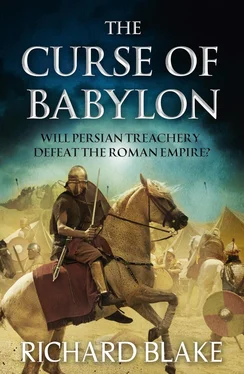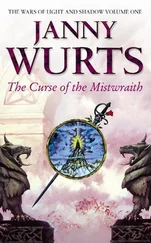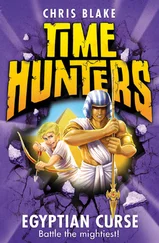Richard Blake - The Curse of Babylon
Здесь есть возможность читать онлайн «Richard Blake - The Curse of Babylon» весь текст электронной книги совершенно бесплатно (целиком полную версию без сокращений). В некоторых случаях можно слушать аудио, скачать через торрент в формате fb2 и присутствует краткое содержание. Жанр: Исторические приключения, на английском языке. Описание произведения, (предисловие) а так же отзывы посетителей доступны на портале библиотеки ЛибКат.
- Название:The Curse of Babylon
- Автор:
- Жанр:
- Год:неизвестен
- ISBN:нет данных
- Рейтинг книги:4 / 5. Голосов: 1
-
Избранное:Добавить в избранное
- Отзывы:
-
Ваша оценка:
- 80
- 1
- 2
- 3
- 4
- 5
The Curse of Babylon: краткое содержание, описание и аннотация
Предлагаем к чтению аннотацию, описание, краткое содержание или предисловие (зависит от того, что написал сам автор книги «The Curse of Babylon»). Если вы не нашли необходимую информацию о книге — напишите в комментариях, мы постараемся отыскать её.
The Curse of Babylon — читать онлайн бесплатно полную книгу (весь текст) целиком
Ниже представлен текст книги, разбитый по страницам. Система сохранения места последней прочитанной страницы, позволяет с удобством читать онлайн бесплатно книгу «The Curse of Babylon», без необходимости каждый раз заново искать на чём Вы остановились. Поставьте закладку, и сможете в любой момент перейти на страницу, на которой закончили чтение.
Интервал:
Закладка:
He’d finished — and there was no point in continuing. Down below, the eunuchs had started an impromptu medley of war ballads. There were limits to how those of us about him could express our delight at the Royal Eloquence and strategic wisdom. With a face as dark as the sky, the Great King walked from the platform. He didn’t wait for the eunuchs to get their canopy over him.
‘Chosroes,’ I called out in a voice that was surprisingly calm. There are times when fear leaves you paralysed. Then there are times when you realise what you had always intended and what has to be done. ‘Chosroes,’ I called again, this time in Greek and using the Greek version of his name, ‘can I have a moment with you?’
I’d called to him as he was going past about ten feet away. A couple of the Royal Guard had pulled their swords out and were moving swiftly across the rocky ground in my direction. Chosroes stopped and looked round. I took off my helmet and pulled at the black cloth that covered my hair. He gave me one of his blank and disconcerting scares. Then he smiled and hurried forward through the rain. He waved the armed men back into line.
‘Alaric, my dear fellow!’ he cried in Greek. ‘I’d been wondering when you would show your face.’ He took me by the hands. ‘Come out of this awful rain. You’ll catch your death of cold.’
Chapter 58
I held the scroll in each hand, and unwound it to what I knew was a favourite passage. I put my mind into order and read:
Now that he had taken Athens, Xerxes sent a messenger back to the Persian capital, to announce his success. The next day, he called together all the Athenians who had deserted their nation and sworn fealty to him, and ordered them to make sacrifice on the Acropolis in the manner of their nation. It may be that the Great King had himself been ordered in a dream to make this concession. Or it may be that he was sorry to have burned the temple of Athene. Whatever the case, these renegade Athenians at once obeyed.
Chosroes interrupted: ‘I don’t think, dear Alaric, you are making a completely faithful translation of the text.’ He pointed at one of the words on the page I had before me. ‘The Athenians here are described as exiles, not as traitors. Also, there is no mention of fealty in the Greek of Herodotus.’
So far as you can when the man behind you has a sword to your throat, I shrugged. ‘I can’t argue with that,’ I said. ‘However, a literal translation into Persian might not make as much sense as you presently want. Where individual passages are concerned, some degree of paraphrase must be permitted.’ Chosroes nodded and sat back. He looked about to see that everyone had noted his command of his mother’s language. He smiled complacently and motioned me to continue:
I mention this circumstance because, on the Acropolis, there is a temple of Erechtheus, in which there is both an olive tree and a representation of the sea. These commemorate the ancient contest between Athene and Poseidon for mastery of Attica. Now, the Persians had burned this olive tree along with the temple. However, just one day after this, the renegade Athenians saw that the tree had miraculously put forth a new shoot about eighteen inches long.
Though not quite the Prodigal Son, I had few reasons to complain about my reception into the Great King’s bosom. I was bathed and shaved and oiled, and arrayed in a clean and reasonably dry robe. I was sitting beside him, a smell of cooking drifting my way as often as one of the tent flaps was open. After a brief intermission, the rain was back and its rapid and continuous beating on the leather roof meant that I had to keep my voice loud as well as steady.
‘There will be no olive shoots after my visit to Athens,’ Chosroes said firmly. ‘Such Mass as I may permit in the converted temple of Athene will be held in Syriac.’ He looked about once more and laughed. ‘But tell me, Alaric, you were in Athens some years ago. Does the sacred olive tree still grow there?’
‘Justinian had it dug out eighty years ago,’ I answered. ‘Since the proscription of the Old Faith, no one had pruned it and it was undermining the foundations of a building he wanted for a monastery.’
‘Did you hear that?’ Chosroes asked the line of trembling boys for whom I’d been translating. ‘Do you see why total extirpation is the only answer to the Greek menace?’ He glowered and sat forward. ‘But which of you will confess to sacrilege against my person?’ he demanded in a voice that suddenly dripped menace. ‘Who has eaten my melon?’ One of the younger boys started to cry — not a good move when Chosroes was in this sort of mood. ‘Silence!’ he barked. He got up and pointed, his finger wavering now right, now left. ‘Start at that end,’ he said eventually. He sat down and reached for his scratching stick. Two of the guards stepped forward and seized the boy farthest on the right from us. They pulled him to the floor and ripped his shirt away. To screams that left me clutching the scroll so hard its papyrus split and crumbled, one of them slit his stomach open. Even as I told myself not to, I watched the boy’s red and steaming entrails pulled out of his body and then at his shocked, uncomprehending eyes.
‘Nothing in this one, Your Majesty,’ the guard said, wiping his hands on a cloth. ‘Shall I carry on with the others?’ No longer screaming, the boy was letting out a shrill, rattling moan. His body flopped about in a dying rhythm.
‘Chosroes turned the corners of his mouth down. ‘In your own time,’ he said. He looked at me. ‘But Alaric, enough of Athens — tell my boys about the futile stand of Leonidas and his Spartans.’ He got up and rummaged in a box. He came back with another large and battered scroll. I took this in hands that I forced not to tremble and unwound it to the relevant passage:
The Persians now attacked once more, and the Spartans, knowing that this would be their end, came out to fight in the wide area of the pass at Thermopylae. Driven on with whips by their officers, the Persians surged forward. Many fell into the sea and were killed. Many fell down on the ground and were trodden to death. Many more were killed by the Spartans, who knew they would soon be attacked from behind and fought on with the most reckless courage. .
‘Get on with it, Alaric!’ The Great King urged. ‘It is a most dramatic narrative. Don’t deprive my boys of what awaits those who defy the majesty of a Persian King.’ Perhaps the most awful scream I’d heard all year had brought me to a sudden stop in the reading. I took my eyes away from a splash of blood over my polished toenails, and forced myself back to seeking Persian equivalents for the Greek words in the column of text before me.
Giggling and talking gibberish to himself, Urvaksha had never stopped from playing with his tangle of knotted strings. Now, he bounced up and down, rattling his golden chain. ‘The knots don’t lie,’ he cackled. ‘The knots never lie.’
I waited for someone to bring a lamp closer to me, and went steadily through the last stand of the Three Hundred — the death of Leonidas, the fourfold repulse of the main Persian army, the culmination of a frantic slaughter that had held up the advance long enough for the Athenians to stop arguing with each other and get their naval counter-attack ready in the Bay of Salamis. Raising my voice above screams for mercy and of terror, I reached the closing stage of the battle:
At last, however, the Persians were able to attack from behind, and the surviving Spartans withdrew to a low mound at the entrance to the pass — that is, to where a stone lion is now placed in memory of King Leonidas. Here, they continued fighting against overwhelming odds. Those who still had them fought with knives. Those who had lost all their weapons fought on with hands and teeth. It was only by volley after volley of arrows that their resistance was ended and all were finally killed.
Читать дальшеИнтервал:
Закладка:
Похожие книги на «The Curse of Babylon»
Представляем Вашему вниманию похожие книги на «The Curse of Babylon» списком для выбора. Мы отобрали схожую по названию и смыслу литературу в надежде предоставить читателям больше вариантов отыскать новые, интересные, ещё непрочитанные произведения.
Обсуждение, отзывы о книге «The Curse of Babylon» и просто собственные мнения читателей. Оставьте ваши комментарии, напишите, что Вы думаете о произведении, его смысле или главных героях. Укажите что конкретно понравилось, а что нет, и почему Вы так считаете.












